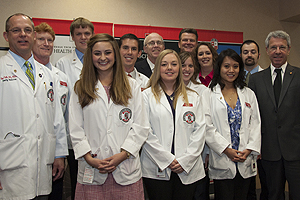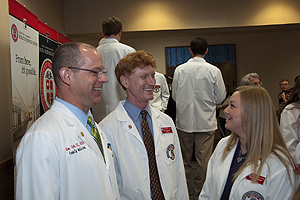School is in for Summer

Students enrolled in the FMAT program will be the first group of future physicians to receive a medical degree in three years.
While most students are putting down their pencils and closing their books this summer, nine students in the School of Medicine have begun an innovative program that will move them into clinics and hospitals a year earlier than their colleagues.
Keeley Bramblett, of Post; Clay Buchanan, of Little Rock, Ark.; Tiffany Bunag, of Houston; Robert Cooper, of Edgewood; Eileen Dee, of Wharton; Emily Dosier, of Canton; Amanda Hartman, of China Spring; Seth Wilhelm, of Witchita Falls; and Charles Willnauer, of Olathe, Kan.; make up the first class of the new Family Medicine Accelerated Track (FMAT) program.
“This is a group of pioneers,” said Steven L. Berk, M.D., provost, executive vice president, and School of Medicine dean. “This will be the first group of students to graduate with a medical degree after a three-year track.”
TTUHSC announced the program last year after it was approved by Liaison Committee on Medical Education, the nationally recognized accrediting authority for medical education.
A Fantastic Discipline
After graduation, FMAT students will enter a three-year TTUHSC family medicine residency program in Lubbock, Amarillo or the Permian Basin. Each will receive a scholarship in their first year of medical school, take special courses and be mentored by experienced primary care physicians.
“They’ll see family medicine for the fantastic discipline it is,” Berk said.
Primary care physicians in general internal medicine, family medicine and general pediatrics receive less pay than those in specialized fields like dermatology or plastic surgery, yet they still build the high debt that four years of medical school brings.
Ronald L. Cook, D.O., chair of the Department of Family and Community Medicine, said the FMAT program enables outstanding family medicine students to reduce the length of medical school by 25 percent and cut their debt in half.

Ronald Cook, D.O., speaks with FMAT students Clay Buchanan and Keeley Bramblett after a press conference introducing them and their classmates to the community.
“The high cost of medical school and resulting debt are major challenges for many prospective medical students,” Cook said. “Our program addresses debt on two levels, first by shortening the program from four to three years, and second, by providing scholarships to all qualifying students. With programs such as this, we can double the number of primary care physicians available to care for the U.S. population.”
Primary Concern
According to the American Academy of Family Physicians (AAFP), since 1997, U.S. medical school graduate matches in family medicine and general internal medicine programs have fallen by nearly 50 percent. A 2006 AAFP Workforce Study estimated that the U.S. would need approximately 39,000 more family physicians by 2020.
Without an adequate number of family medicine physicians and other primary care providers, health care becomes less efficient, fragmented and more costly, Berk said, adding that medical schools have a responsibility to figure out why only 10 percent of medical students in the U.S. are going into family medicine. The FMAT program is a step in the right direction.
“There are many outstanding students from West Texas committed to being hometown doctors and the FMAT program will encourage such students and help guarantee their success,” Berk said. “The School of Medicine will lead the country in its commitment to produce excellent primary care physicians.”
The FMAT program has been presented at many national meetings, and several other medical schools throughout the U.S. are preparing to begin similar three-year programs.
Family Medicine Pioneers
http://www.youtube.com/watch?v=kv2PNHlcm3kImage Gallery
Related Stories
Celebrating Veterans: TTUHSC’s General Martin Clay’s Legacy of Service and Leadership
From his initial enlistment in the Army National Guard 36 years ago to his leadership in military and civilian health care management roles, Major General Martin Clay’s career has been shaped by adaptability, mission focus and service to others.
Texas Tech University Health Sciences Center School of Nursing Named Best Accelerated Bachelor of Science in Nursing Program in Texas
The TTUHSC School of Nursing Accelerated Bachelor of Science in Nursing (BSN) program has been ranked the No. 1 accelerated nursing program in Texas by RegisteredNursing.org.
TTUHSC Names New Regional Dean for the School of Nursing
Louise Rice, DNP, RN, has been named regional dean of the TTUHSC School of Nursing on the Amarillo campus.
Recent Stories
National Academy of Inventors Names TTUHSC Faculty Senior Members
The National Academy of Inventors (NAI) has designated two current and one former TTUHSC faculty researchers as Senior Members.
The John Wayne Cancer Foundation Surgical Oncology Fellowship Program at Texas Tech University Health Sciences Center Announced
TTUHSC is collaborating with the John Wayne Cancer Foundation and has established the Big Cure Endowment, which supports the university’s efforts to reduce cancer incidence and increase survivability of people in rural and underserved areas.
TTUHSC Receives $1 Million Gift from Amarillo National Bank to Expand and Enhance Pediatric Care in the Panhandle
TTUHSC School of Medicine leaders accepted a $1 million philanthropic gift from Amarillo National Bank on Tuesday (Feb. 10), marking a transformational investment in pediatric care for the Texas Panhandle.
